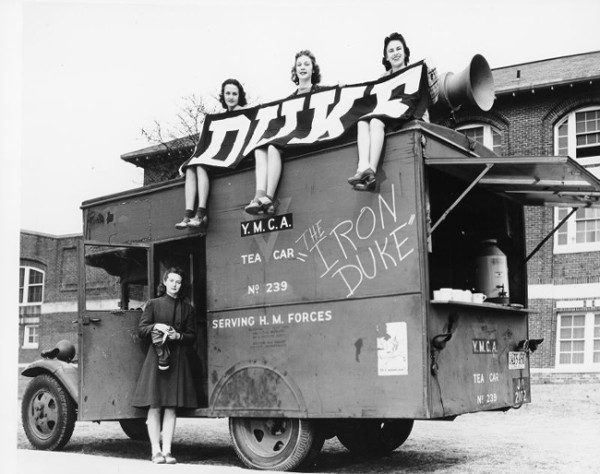
In 1917, at the suggestion of President William Few, the women of Trinity College started a chapter of the Young Women's Christian Association (YWCA) to aid in the war effort. In 1925, members drafted a new constitution and officially became the YWCA at Duke University.1
The YMCA and the YWCA were at the forefront of addressing social issues. In the 1930s, both groups had Interracial Committees that met jointly with students from the Negro College in Durham (now North Carolina Central University) and worked on behalf of improved race relations. Members of both organizations were also involved in the peace movement (before the outbreak of WWII) and were interested in improving conditions for workers.
Activities: During the period 1930-1949, the YMCA and YWCA were prominent and influential organizations on campus with hundreds of members. Their activities were numerous including:
- Sponsorship of peace, labor relations, and leadership conferences (YMCA/YWCA)
- Organizers of Durham Girls' Clubs (YWCA)
- Annual Thanksgiving dinner for local boys (YMCA)
- Community outreach to organizations such as Wright Refuge, King's Daughters Home, and Edgemont Community Center (YMCA/YWCA)
- First-year orientation activities (YMCA/YWCA)
- Religious Emphasis Week (YMCA/YWCA)
- Annual Dad's Day (YMCA)
- Sponsorship of lectures, dances, concerts, and athletic events (YMCA/YWCA)
Some Notable Members:
- Clarice Bowman (AB, 1931; Divinity AM, 1933 ); YWCA Vice President, 1930; one of the first women to receive a degree from the School of Religion; Jonathan Fisher Professor Emeritus, Bangor Theological Seminary
- Charles Beatty: (AB, 1935; Divinity AM, 1938): Navy Chaplain
- Rufus Tim Brinn (AB, 1940): Recipient of Naval Silver Star
- Frederic N. Cleaveland (AB, 1937; AM, 1942): YMCA President, 1936-1937; Professor of Political Science, UNC-Chapel Hill, 1941-1971 and Duke, 1971-1979; Duke Provost, 1971-1979
- Mary Duke Biddle Trent Semans: (AB, 1939); First female Chair of the Duke Endowment; Chair of the Mary Duke Biddle Foundation
Nationwide: George Williams, a London department store worker, founded the YMCA in 1844 as a "refuge of Bible study and prayer for young men seeking escape from the hazards of life on the street."2 Eleven years later in 1855, the YWCA was founded in London by Emma Roberts and Mrs. Arthur Kinnaird. In 1851, Thomas Valentine Sullivan started the YMCA chapter in the United States at the Old South Church in Boston. The first YWCA chapters appeared in New York City and Boston in 1858.
1. Patrick, Ben Moore, The Front Line: Materials for a Study of Leadership in College and After, Durham, NC: Duke University, 1942, p. 53-56.
2. YMCA: History of Our Founding. Accessed 14 May, 2018.
